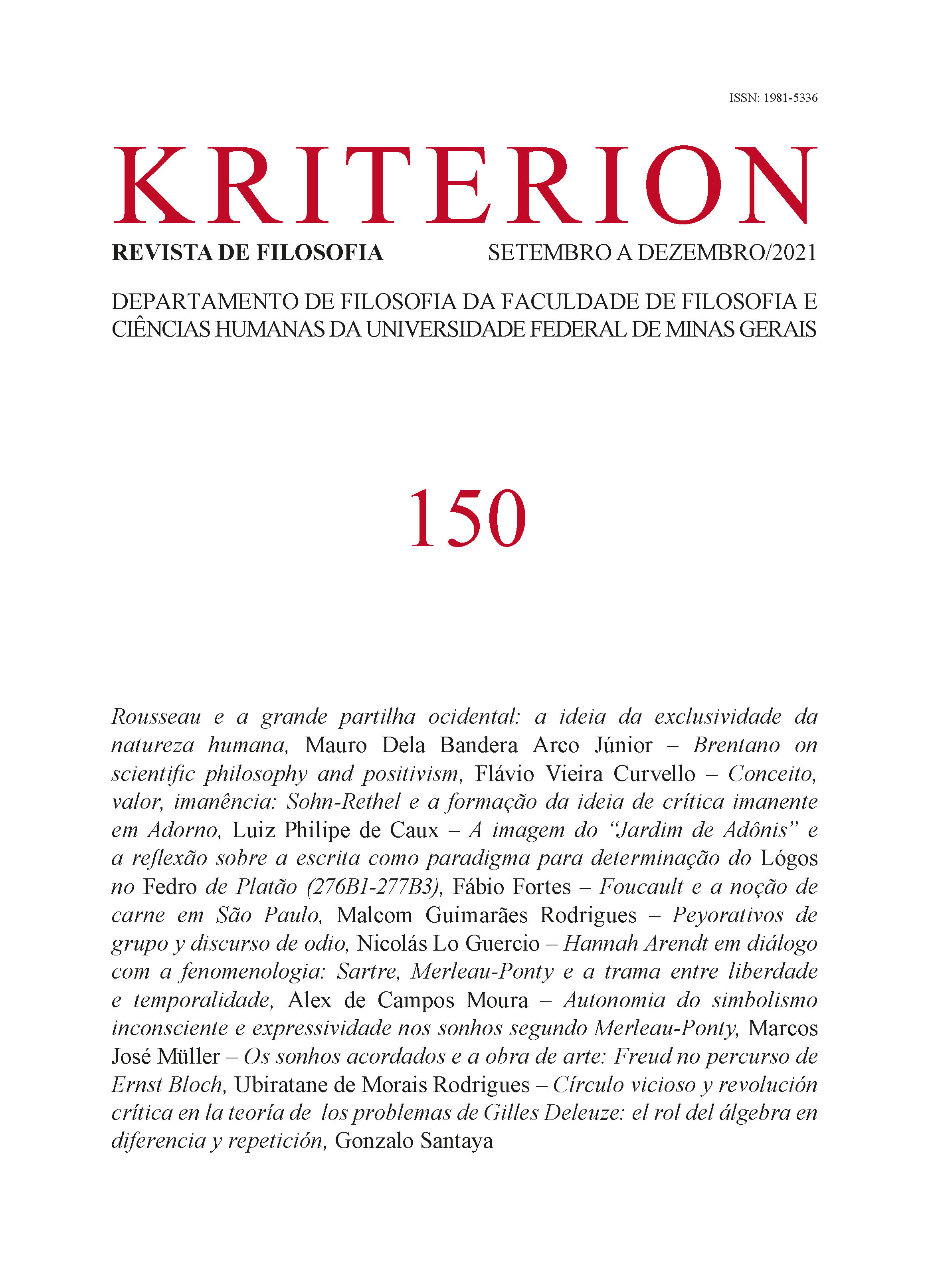HANNAH ARENDT DIALOGUE WITH PHENOMENOLOGY
Sartre, Merleau-Ponty and the plot between freedom and temporality
Keywords:
Freedom, Temporality, Phenomenology, Hannah Arendt, Sartre, Merleau-PontyAbstract
In this essay, we will discuss the way in which the relationship between freedom and temporality appears at certain moments of Hannah Arendt,
Sartre and Merleau-Ponty reflections, taking the way in which each of them conceives the articulation between permanence and change in time dynamics
as an axis of investigation. With this, it is intended to establish a horizon of convergence and, within it, to make explicit two different approaches to a similar
issue, showing how it is possible to establish a common phenomenological axis and, at the same time, explain the diversity that constitutes it.
Downloads
References
AGOSTINHO. “De Civita Dei”. Trad. Oscar Paes Leme. Rio de Janeiro: Vozes, 2012. Parte II
ARENDT, H. “The life of the mind”. Trad. Antônio Abranches. Rio de Janeiro: Relume Dumará, 1991. [Harcout Brace, 1978].
______. “The Human Condition”. Trad. Roberto Raposo. Rio de Janeiro: Forense Universitária, 1987. [Chicago, 1958].
______. “Between Past and Future”. New York: Viking Press, 1961.
______. “O conceito de amor em Agostinho”. Lisboa: Instituto Piaget, 1997.
______. “O que é a filosofia da Existenz?”. In: ARENDT, H. A Dignidade da Política. Rio de Janeiro: Relume Dumará, 2002a.
______. “O interesse pela política no recente pensamento europeu”. In: ARENDT, H. A Dignidade da Política. Rio de Janeiro: Relume Dumará, 2002b.
BARBARAS, R. “Merleau-Ponty et la Psychologie de la Forme”. Les Études philosophiques, Nr. 2, 2001.
BENHABIB, S. “Feminist theory and the concept of public space in Hannah Arendt”. In: History of the Human Sciences, 1993.
______. “The Destruction of the Public Sphere and the Emergence of Totalitarism”. In: The reluctant modernism of Hannah Arendt. Oxford: Lanham: Rowman & Littlefield Publishers, 1996.
BIMBENET, E. “De la science à la philosophie”. In: Les Cigognes de la philosophie. Paris: L’Harmattan, 2002.
DUARTE, A. “Poder, violência e revolução no pensamento político de Hannah Arendt”. Cadernos de Filosofia Alemã, Vol. 21, 2016.
MERLEAU-PONTY, M. “Phénoménologie de La Percetion”. Trad. Carlos Alberto Ribeiro de Moura. São Paulo: Martins Fontes, 1994. [Gallimard, 1945].
______. “L’institution. La passivité”. Paris: Belin, 2003.
______. “La Structure du Comportement”. Paris: PUF, 1967.
MOURA, C. A. R. “Racionalidade e crise”. São Paulo: UFPR, 2001.
PITKIN, H. “Justice. On relating private and public”. Political Theory, Vol. 3, Nr. 9, pp. 327-352, 1981.
SARTRE, J.-P. “L’imaginaire”. Paris: Éllipses, 1999.
______. “O Ser e o Nada”. Rio de Janeiro: Vozes, 1997.
SILVA, F. “Ética e Literatura em Sartre”. São Paulo: UNESP, 2004.
______. “Literatura, ética e política em Sartre”. Teresa, São Paulo, Nr. 10-11, 2010
Downloads
Published
How to Cite
Issue
Section
License
Copyright (c) 2021 Revista Kriterion

This work is licensed under a Creative Commons Attribution 4.0 International License.










